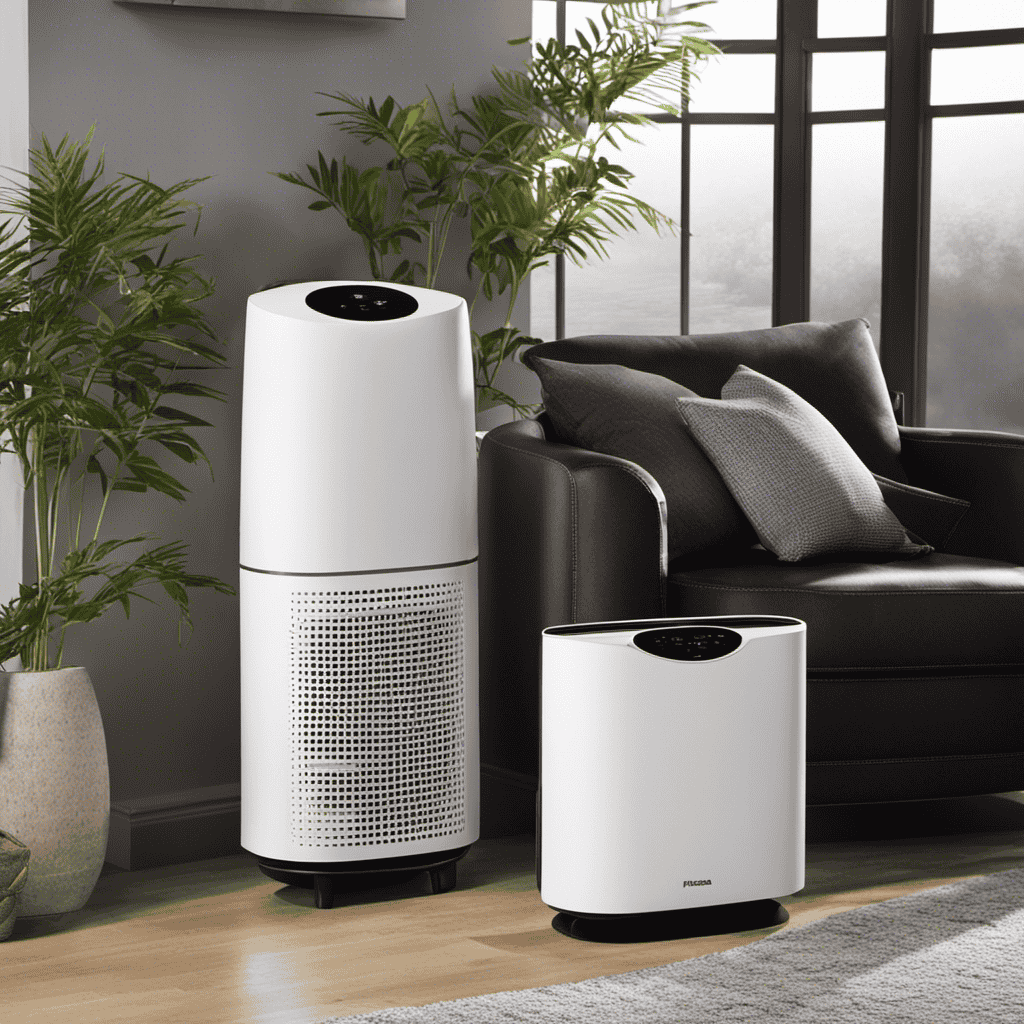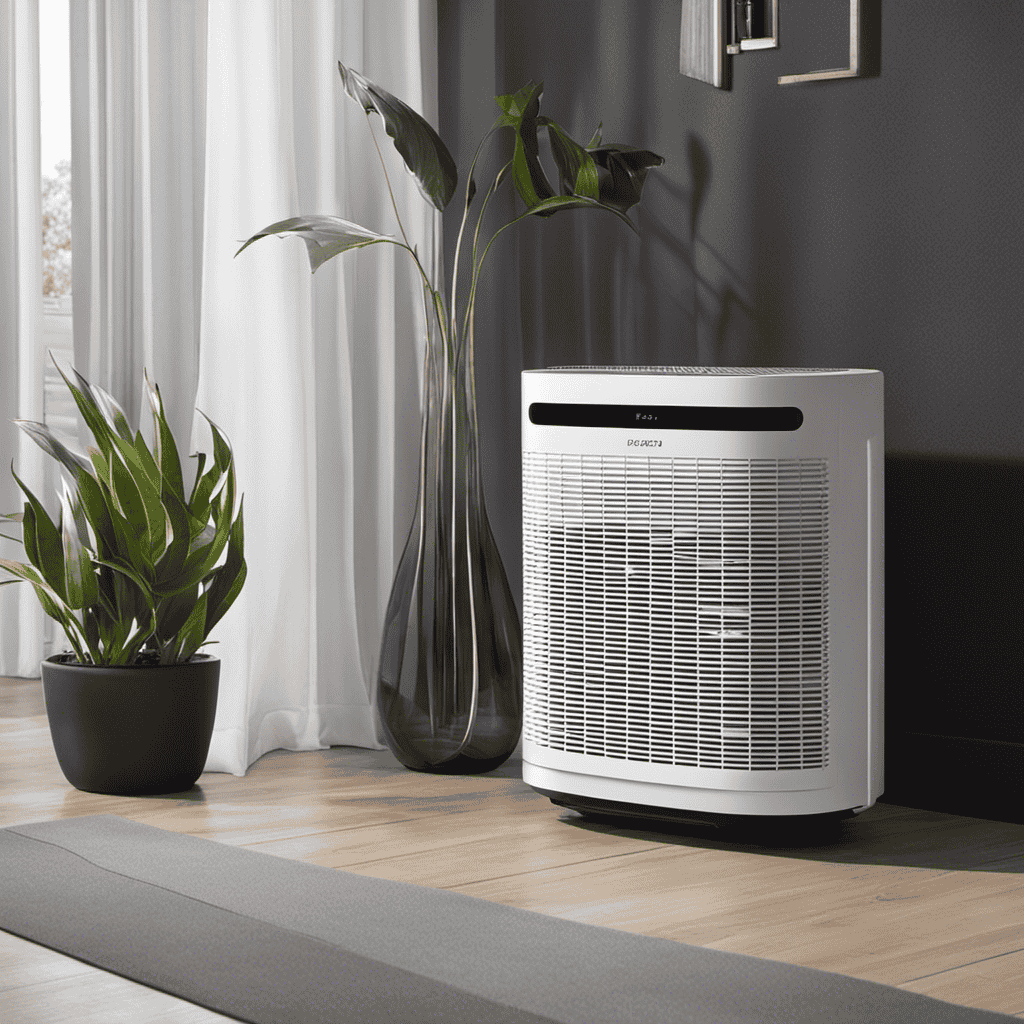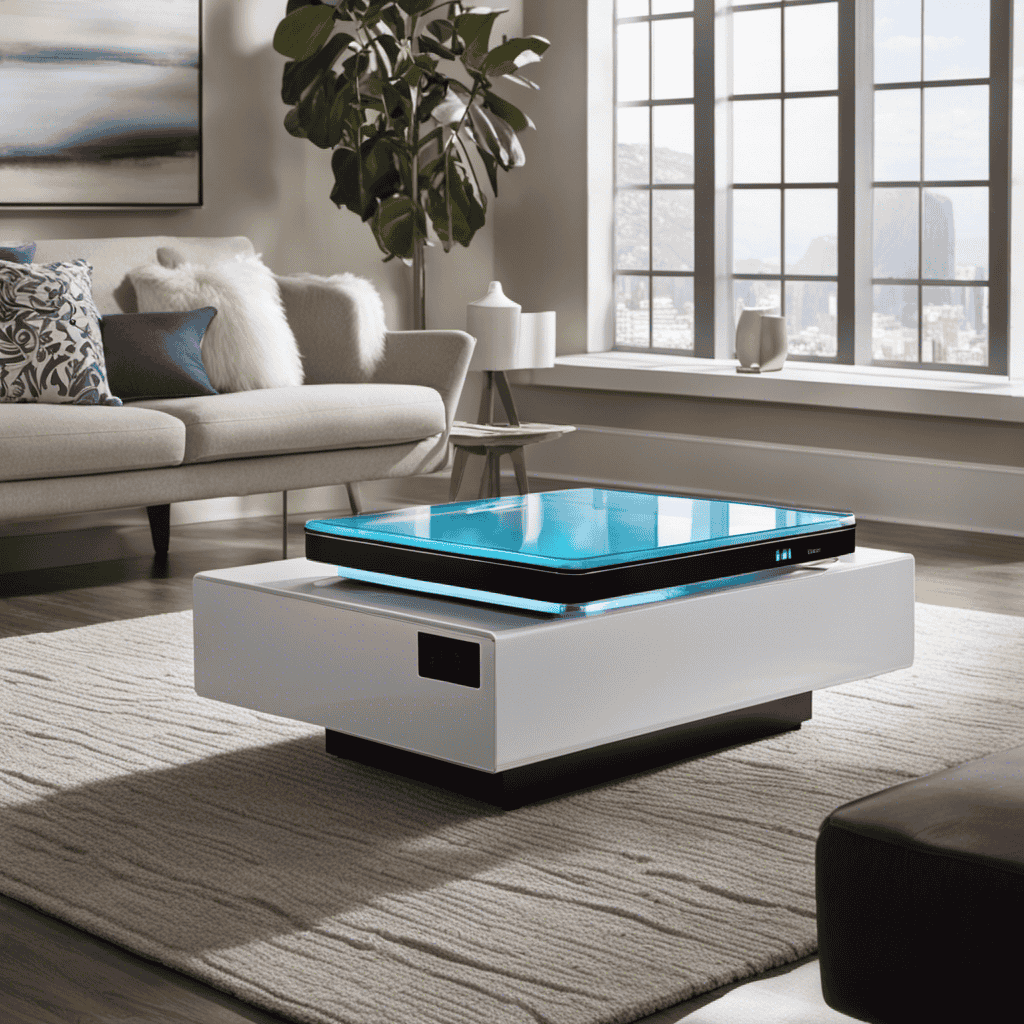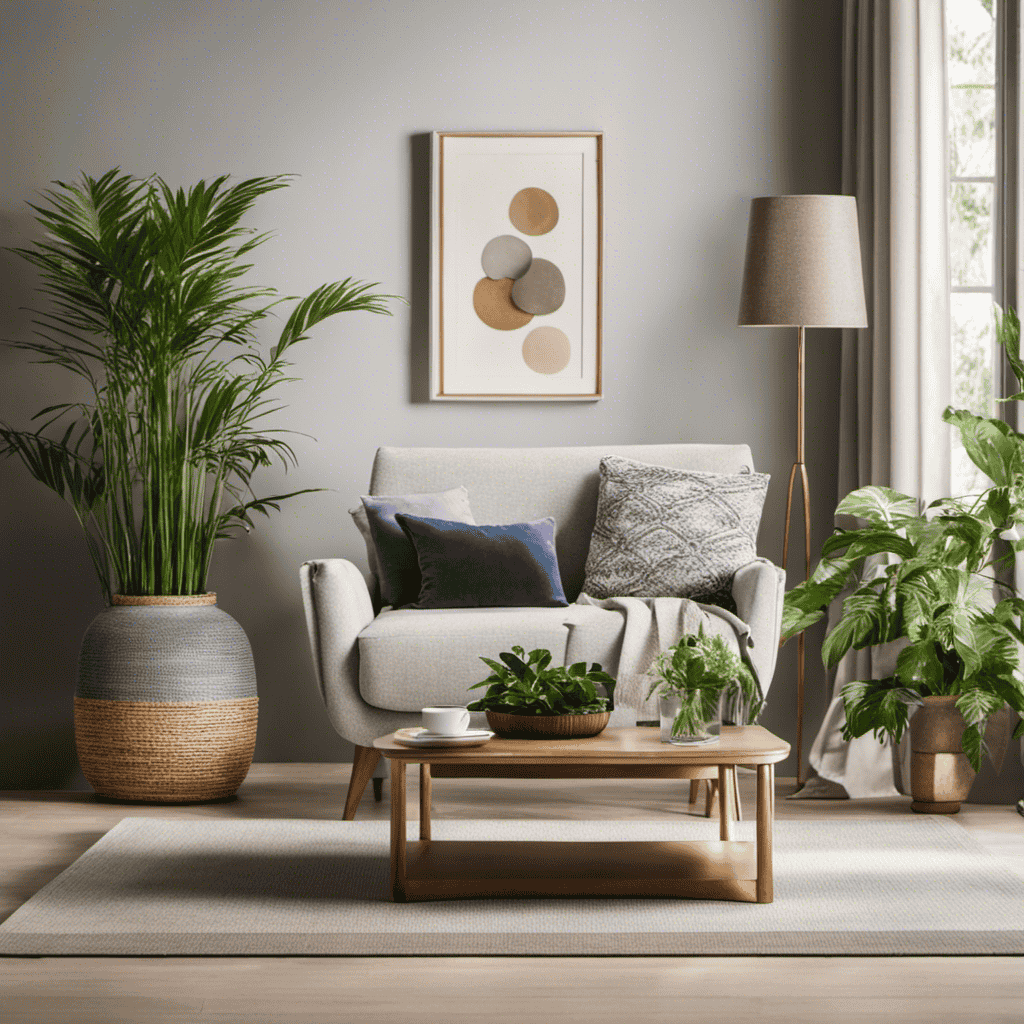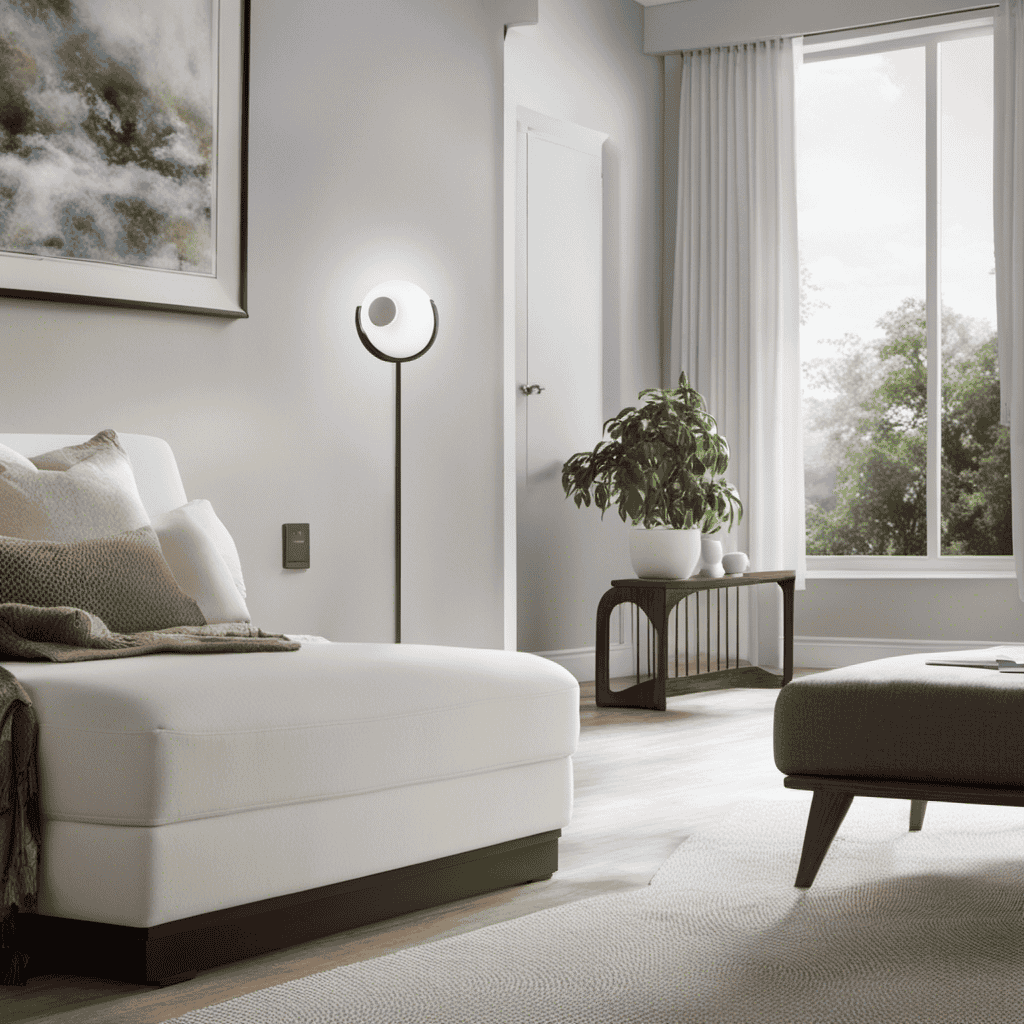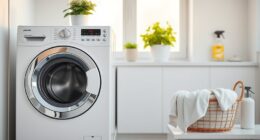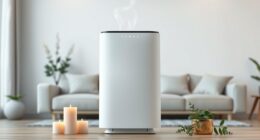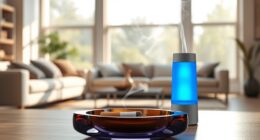I’ve constantly pondered what truly is the superior defense against air contaminants: a HEPA air purifier or an air filter? The moment has arrived to definitively resolve this argument.
In this article, we’ll delve into the differences between these two devices, explore the technology behind HEPA filters, and analyze the benefits of using them.
We’ll also consider the advantages of air filters and provide you with the factors to consider when choosing between the two.
Get ready for a scientific showdown!
Key Takeaways
- HEPA air purifiers are more effective in capturing smaller particles like pollen, mold spores, and bacteria compared to air filters.
- HEPA filters have a higher efficiency in removing allergens, dust, and pollutants, leading to improved indoor air quality.
- HEPA air purifiers provide relief and prevention of allergies, reduction of respiratory symptoms, and cleaner and healthier air.
- While both HEPA air purifiers and air filters help remove airborne pollutants, the effectiveness may vary, so it’s important to consider your specific needs and desired level of air purification.
The Difference Between HEPA Air Purifiers and Air Filters
If you’re wondering about the difference between HEPA air purifiers and air filters, let’s break it down for you.
Understanding air filtration is essential when it comes to creating a clean and healthy indoor environment. When comparing purification methods, it’s important to note that air filters are designed to capture larger particles, such as dust and pet dander, while HEPA air purifiers can remove smaller particles, including pollen, mold spores, and even some bacteria.
Air filters work by physically trapping particles in the filter media, while HEPA air purifiers use a combination of filtration and diffusion to capture and trap particles.
Transitioning into the subsequent section about understanding HEPA technology, let’s delve deeper into how these purifiers effectively clean the air.
Understanding HEPA Technology
To understand HEPA technology, you need to know that it stands for High-Efficiency Particulate Air. It is designed to capture airborne particles as small as 0.3 micrometers.
HEPA filters are widely used in air purifiers and vacuum cleaners due to their effectiveness in removing allergens, dust, and other pollutants from the air.
The filtration process of a HEPA filter involves three main steps: interception, impaction, and diffusion. First, larger particles are intercepted and trapped by the filter fibers. Then, smaller particles collide with the fibers and get stuck through impaction. Finally, the remaining ultrafine particles are captured through the process of diffusion.
These filters have several pros, such as high-efficiency filtration, trapping of microscopic particles, and improving indoor air quality. However, they also have some cons, including the need for regular filter replacement and the inability to remove gases and odors.
Overall, understanding the HEPA filtration process can help individuals make informed decisions when choosing air purifiers or filters for their homes or workplaces.
Benefits of Using HEPA Air Purifiers
Using HEPA air purifiers can have numerous benefits. These devices are designed to capture and trap microscopic particles such as dust, pollen, pet dander, and mold spores, resulting in improved indoor air quality. By effectively removing these pollutants from the air we breathe, HEPA air purifiers can help provide relief and prevention of allergies. They can also help reduce symptoms of respiratory conditions, providing a safer and more comfortable environment. Additionally, the removal of airborne pollutants contributes to cleaner and healthier air.
Improved Indoor Air Quality
Take advantage of the improved indoor air quality by using a HEPA air purifier or an air filter. These devices are effective in improving respiratory health and reducing asthma triggers.
HEPA air purifiers work by using a highly efficient filtration system that can remove particles as small as 0.3 microns, including allergens, dust, pet dander, and pollen. They can also capture bacteria and viruses, improving overall air quality.
Air filters, on the other hand, are designed to remove larger particles from the air, such as dust and pet hair. While they may not be as effective as HEPA air purifiers in capturing smaller particles, they can still contribute to reducing asthma triggers and improving respiratory health.
It is important to choose the right device based on your specific needs and the size of the area you want to improve the air quality in.
Allergy Relief and Prevention
You can find relief and prevent allergies by regularly cleaning your living space and removing potential triggers like dust, pet dander, and pollen.
Allergies are a common problem that affects millions of people worldwide. They occur when the immune system overreacts to substances that are typically harmless, such as pollen or pet dander. By improving the air quality in your home, you can reduce the presence of these allergens and alleviate symptoms.
One effective way to do this is by using air purifiers or air filters. These devices work by capturing and removing particles from the air, including allergens. HEPA air purifiers are particularly effective at filtering out small particles, making them a popular choice for allergy prevention.
However, it’s important to note that while air purifiers can help improve air quality, they are not a complete solution. Regular cleaning, proper ventilation, and minimizing exposure to allergens are also essential for effective allergy relief and prevention.
Removal of Airborne Pollutants
In my previous subtopic, I discussed how air purifiers and filters can help with allergy relief and prevention. Now, let’s shift our focus to the removal of airborne pollutants. This is an important aspect to consider when comparing HEPA air purifiers and air filters.
Airborne pollutants in the workplace can have a significant impact on our health and well-being. They can cause respiratory problems, allergies, and even more serious conditions such as asthma. Having clean air in our homes is crucial for maintaining good health.
Here are three key benefits of clean air in homes:
-
Improved respiratory health: Clean air reduces the risk of respiratory infections and allergies.
-
Enhanced sleep quality: Breathing in clean air promotes better sleep and overall well-being.
-
Increased productivity: Clean air in the home can improve concentration, focus, and productivity.
Therefore, when choosing between a HEPA air purifier and an air filter, it is essential to consider their effectiveness in removing airborne pollutants to ensure a healthier environment.
Advantages of Air Filters
The advantages of air filters include improved indoor air quality and reduced allergens in the home. Air filters are designed to remove particles from the air, such as dust, pollen, pet dander, and mold spores. They work by trapping these particles in a filter, preventing them from circulating in the air that we breathe.
There are different types of air filters available, including HEPA filters, activated carbon filters, and electrostatic filters. HEPA filters are highly efficient in capturing tiny particles, as small as 0.3 microns, and are recommended for individuals with allergies or respiratory conditions. Activated carbon filters are effective in removing odors and chemicals from the air. Electrostatic filters use an electrostatic charge to attract and capture particles.
Overall, air filters provide a valuable solution for improving indoor air quality and reducing allergens in the home.
Factors to Consider When Choosing Between HEPA Air Purifiers and Air Filters
Now that we have discussed the advantages of air filters, let’s turn our attention to the factors to consider when choosing between HEPA air purifiers and air filters.
When it comes to improving air circulation and reducing indoor pollutants, both options have their merits. However, there are a few key differences to consider.
- Noise Levels Comparison:
HEPA Air Purifiers: Many HEPA air purifiers come with adjustable fan speeds, allowing you to control the noise levels. Some models even have a ‘quiet mode’ for minimal disturbance.
Air Filters: Air filters, on the other hand, do not have any noise-producing components. They operate silently, making them a great choice if noise is a concern in your environment.
Overall, when deciding between HEPA air purifiers and air filters, noise levels should be taken into account, especially if you require a quiet and peaceful indoor environment.
Final Verdict: Which Is the Better Option?
In determining the better option between HEPA air purifiers and air filters, it is crucial to consider important factors such as cost and effectiveness, maintenance requirements and lifespan, and suitability for specific needs.
Analyzing the cost and effectiveness of both options will provide insight into their value and efficiency in improving indoor air quality. Understanding the upfront cost of purchasing the equipment, as well as any ongoing expenses for replacement filters or maintenance, is essential. Additionally, evaluating the effectiveness of each option in removing pollutants and allergens from the air will help determine which one is more efficient in providing clean and healthy air.
Examining the maintenance requirements and lifespan of HEPA air purifiers and air filters will help determine the long-term viability and convenience of each option. Some air purifiers may require regular filter replacements or cleaning, while others may have a longer lifespan and require less maintenance. Considering the time and effort needed to maintain each option is important in making a practical choice.
Lastly, understanding how well each option aligns with specific needs, such as allergies or respiratory conditions, will aid in making an informed decision. HEPA air purifiers are known for their ability to capture and remove small particles, making them suitable for individuals with allergies or asthma. Air filters, on the other hand, may be more effective in trapping larger particles and odors. Assessing these specific needs and finding the option that best addresses them will ensure optimal air quality for the intended users.
Cost and Effectiveness
Cost and effectiveness are major factors to consider when deciding between a hepa air purifier and an air filter. These two options have their own advantages and drawbacks, and it is important to weigh them carefully before making a decision.
Here is a cost comparison and effectiveness comparison to help you make an informed choice:
-
Cost Comparison:
-
Hepa Air Purifier: Generally, hepa air purifiers tend to be more expensive upfront compared to air filters. However, they usually have longer lifespans and require less frequent filter replacements, which can offset the initial cost in the long run.
-
Air Filter: Air filters are typically more affordable upfront, but they need to be replaced more frequently. The cost of replacement filters can add up over time.
-
Effectiveness Comparison:
-
Hepa Air Purifier: Hepa air purifiers are highly effective at removing small particles from the air, such as dust, pollen, pet dander, and mold spores. They can improve indoor air quality significantly and provide relief for individuals with allergies or respiratory conditions.
-
Air Filter: Air filters are also effective at removing particles from the air, but their efficiency may vary depending on the type and quality of the filter. They are generally recommended for capturing larger particles like dust and pet hair.
Considering the cost and effectiveness comparison, it is crucial to evaluate your specific needs, budget, and desired level of air purification when choosing between a hepa air purifier and an air filter.
Maintenance Requirements and Lifespan
When considering maintenance requirements and lifespan, it’s important to evaluate how often filters need to be replaced for each option.
In terms of maintenance requirements, HEPA air purifiers typically require regular filter replacements every six to twelve months. This ensures optimal performance and efficiency.
On the other hand, traditional air filters may need to be replaced more frequently, typically every one to three months, depending on the level of pollutants in the environment.
When it comes to lifespan, HEPA filters tend to have a longer lifespan compared to standard air filters. This is because HEPA filters are made with high-quality materials that are designed to capture even the smallest particles.
Additionally, HEPA filters are known for their superior performance in removing allergens and other airborne contaminants.
Overall, the maintenance requirements and lifespan of HEPA air purifiers make them a cost-effective and efficient option for improving indoor air quality.
Suitability for Specific Needs?
To determine the suitability of each option for your specific needs, consider factors like the size of the space you want to purify and the specific pollutants you want to target. When comparing a HEPA air purifier and an air filter, it’s important to evaluate their specific requirements and cost comparison.
Factors to consider for specific requirements:
- Size of the space: A HEPA air purifier is suitable for smaller spaces like bedrooms or offices, while an air filter can cover larger areas like living rooms or open floor plans.
- Pollutant types: HEPA air purifiers are effective at removing allergens, dust, and pet dander, while air filters can also target odors, smoke, and chemicals.
- Noise level: HEPA air purifiers tend to be quieter compared to air filters, making them more suitable for noise-sensitive environments.
Cost comparison:
- Upfront cost: HEPA air purifiers are generally more expensive than air filters due to their advanced filtration technology.
- Maintenance cost: Air filters typically require regular replacement, adding to their overall cost, while HEPA air purifiers only require filter replacement every few months.
Considering these factors, you can determine which option is better suited for your specific needs and budget.
Frequently Asked Questions
How Often Should I Replace the Filters in a HEPA Air Purifier?
I replace the filters in my HEPA air purifier every 6 months. It’s important to follow the manufacturer’s guidelines for when to replace HEPA filters, as they can vary depending on usage and air quality.
Can HEPA Air Purifiers Eliminate Odors in Addition to Filtering Out Particles?
Hepa air purifiers can eliminate odors by using activated carbon filters. This is an advantage they have over ionizers, which only remove particles. However, the effectiveness of odor elimination may vary depending on the specific purifier.
Are Air Filters More Cost-Effective in the Long Run Compared to HEPA Air Purifiers?
Air filters may be more cost-effective in the long run compared to HEPA air purifiers. Their initial cost is lower, and they only require periodic filter replacements. However, the effectiveness of air purifiers should also be considered.
Can HEPA Air Purifiers Remove Pet Dander and Allergens From the Air?
Yes, HEPA air purifiers can effectively remove pet dander and allergens from the air. They are especially beneficial for people with asthma, as they help improve indoor air quality and reduce triggers.
What Is the Recommended Room Size for a HEPA Air Purifier or Air Filter to Effectively Clean the Air?
To effectively clean the air, the recommended room size for a HEPA air purifier or air filter depends on the unit’s CADR (Clean Air Delivery Rate). The higher the CADR, the more effective the purification.
Conclusion
In conclusion, after analyzing the differences between HEPA air purifiers and air filters, it is evident that both options have their advantages.
While HEPA air purifiers are highly effective in removing small particles and allergens from the air, air filters can also provide efficient filtration depending on the specific needs.
Therefore, the choice between the two ultimately depends on individual preferences and requirements. It’s important to consider factors such as air quality, maintenance, and cost before making a decision.
As the saying goes, ‘A breath of fresh air can invigorate the soul.’ So, choose wisely and enjoy the benefits of cleaner and healthier air.
